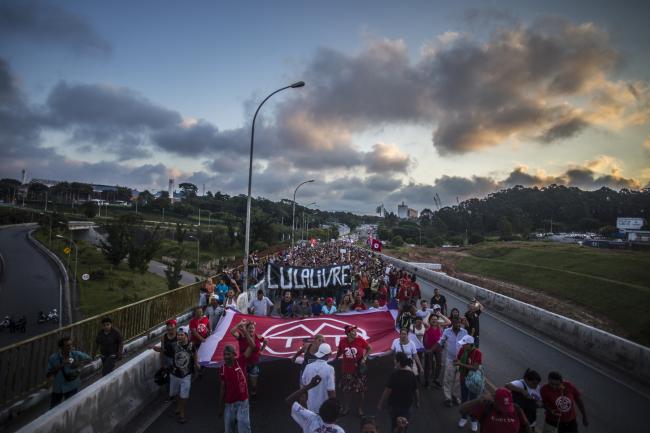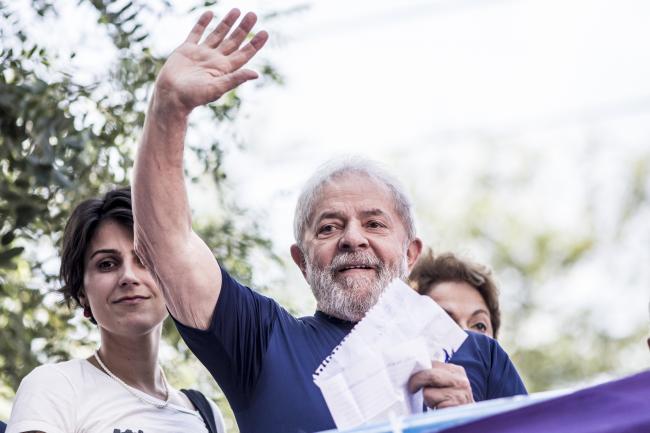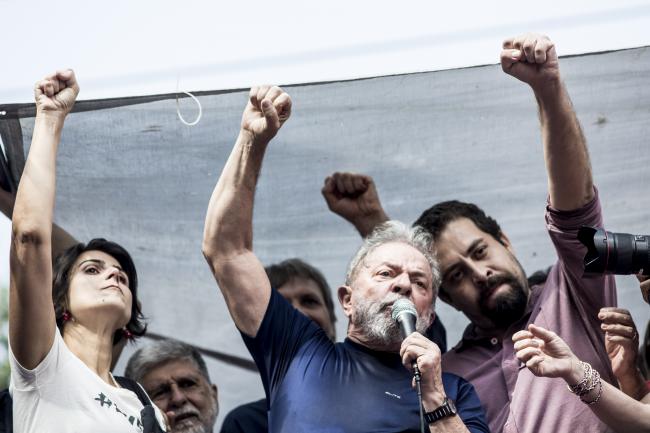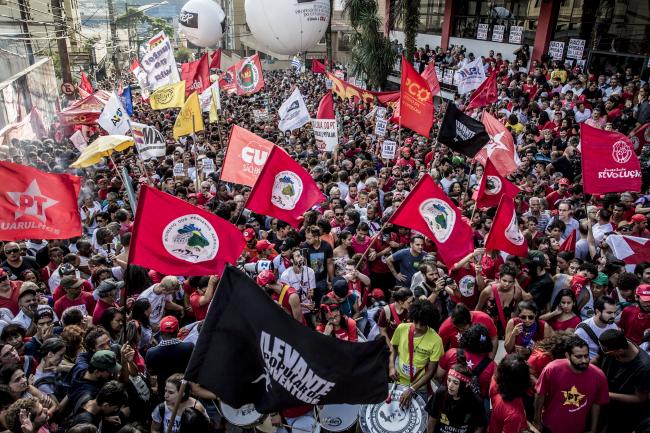
On Friday, April 6, after Brazil’s Central Única dos Trabalhadores union federation (Unified Workers Central, CUT) issued a public call for support, some 20,000 union and social movement members surrounded the ABC Metallurgical Workers Union headquarters in São Bernardo, an industrial suburb of São Paulo. It was there that nearly 40 years ago, Luiz Inácio Lula da Silva, then a metalworker and union president, was projected to the national scene after leading a series of historic strikes that weakened one of the longest dictatorial regimes in Latin America.
Once again, workers united in support of Lula, by this time a former two-term president of Brazil. They refused to let the Federal Police enter the union headquarters, where Lula was staying, and arrest him even after his constitutional right to habeas corpus was denied by the Supreme Federal Court (STF) on Wednesday, in a deeply divided, tense, and controversial ruling.
Sérgio Moro, a federal judge who, ironically, was also the prosecutor in the case, had ordered Lula to turn himself in by 5:00 PM to serve a 12 year sentence, the result of a costly four-year investigation, widely misrepresented in the media, that was unable to produce any material evidence. Through his lawyers, Lula announced that he was not a fugitive but that he would not turn himself in at the time Moro had prescribed. The gathering around the union headquarters grew overnight Friday, culminating in Lula giving one of the most memorable speeches of his career on mid-day Saturday.

Lula was flanked by presidential candidates from the Partido Comunista do Brasil (Communist Party of Brazil, PCdoB) and the Partido Socialismo e Liberdade (Socialism and Liberty Party, PSOL). Afterwards, following advice from his lawyers, he tried to leave the building to turn himself in. A group of union members surrounded his car and refused to let him go. Only after explaining his case to the crowd did he manage to leave for Federal Police headquarters, from which he was taken to the airport and placed on a plane to Curitiba. Currently thousands of people from across Brazil are keeping 24-hour vigil in front of the federal police station, promising to remain until he is freed.
It is important that this story be told, not only because it will undoubtedly be remembered as a pivotal point in Brazilian history, but more immediately because it offers a needed counterpoint to an article recently reprinted in NACLA called, “Lula in Jail: What You Need to Know.” We believe this piece paints an incomplete and at times simply untrue picture of the reaction of leftist parties to Lula’s arrest, the relationship of social movements to the Partido dos Trabalhadores (Workers’ Party, PT), and the PT project itself.
A Tone-Deaf Left or a Tone-Deaf Article?
First, the article as originally published (and as it still appears in Left Voice) contained no fewer than a dozen factual errors, from the size of the Supreme Court to the party name of a key politician. One key error is its suggestion that the arrest has ended Lula’s run for the presidency. The PT has repeatedly said it will fight for Lula’s candidacy using all legal means at its disposal. More importantly, the piece makes several serious charges about Lula and the Brazilian Left that merit further examination. Such claims have the potential to paint an unrepresentative or even misleading picture for foreign readers who may not follow Brazil closely, but who care deeply about the fate of progressive politics in the Americas.
The author prominently cites parties like the Partido Socialista dos Trabalhadores Unificado (Unified Workers’ Socialist Party, PSTU) and Movimento Revolucionário de Trabalhadores (Revolutionary Workers’ Movement, MRT) as though they were representative of the Brazilian Left. However, in the 2016 municipal elections, when Brazilians selected 57,931 city councilors, the PSTU failed to elect even one candidate. In the 2014 presidential election, its candidate received 0.09% of the vote. It's fair to say that if dog catcher were an elected position in Brazil, the PSTU would be unable to elect one. They are a total non-factor on the Brazilian Left and ironically sided with the right on the parliamentary coup that culminated in Dilma Rousseff's illegal impeachment. Similarly, the MRT is a microscopic group of trotskyists that splintered off from the PSTU in 2015. Regardless of their position on Lula, they hardly seem worth mentioning in the context of the crisis at hand.
The piece also cites the response of the PSOL, which broke away from the PT in 2005, claiming that they lack a clear position on Lula’s imprisonment. Although the PSOL is a favorite among foreign (and many Brazilian) academics due to its principled critiques of the PT, it is nonetheless a small party that received less than 2% of the vote in the last two presidential elections. More to the point, despite its small size, the PSOL has consistently supported Lula during his prosecution, and its stance on his imprisonment was quite clear. The PSOL presidential candidate, Guilherme Boulos, was at the São Bernardo metallurgical union with Lula during the standoff, and the party has released several statements in solidarity with Lula in the past week, calling the Supreme Court decision a “stain on the constitution.” Furthermore, on April 8, the PSOL national directorate announced that they consider Lula to be a political prisoner.

A Mobilized Civil Society
It is also important to also clarify the role of the Central Única dos Trabalhadores (Unified Workers Central, CUT), which PT militants helped found in 1983 as an alternative to the state-sponsored unionism enshrined in Brazil’s corporatist labor law. Since Lula was first elected president in 2002, CUT has faced disdain for some on the Left, influenced perhaps by writers like Dave Zirin, who accused the CUT of having sold out to the “neoliberal” PT in his 2013 book Brazil’s Dance with the Devil. Similarly the piece reprinted in NACLA claims, without citing a source, that CUT is “largely controlled by PT officials.”
Although CUT and the PT have historically had close ties, CUT is nonetheless an autonomous union federation with no official party affiliation, and its leaders are democratically elected by its rank-and-file. When CUT officials are asked about their supposed subservience to the PT, they typically point out that strikes increased during the PT years. In 2013, for instance, when the CUT ramped up its criticism of Dilma Rousseff's increasingly centrist government, affiliated unions held over 2,000 strikes. They have repeatedly shown no qualms in striking against PT governments as shown by the five teachers’ strikes against the PT mayor in São Paulo between 2013 and 2016. And when, under PT governments, some 50 former CUT leaders were elected to Congress, they were required to cancel their CUT membership before running for office. Certainly, members of CUT and the PT share a number of allegiances and goals, but it is a leap to claim that this equals control by one over the other.
Seeing CUT as an autonomous labor organization rather than a puppet of the PT lends a new meaning to its actions over the last week. On April 5, the day after Moro ordered Lula's imprisonment, the powerful, CUT-affiliated Federação Única dos Petroleiros (Unified Petroleum Workers’ Federation, FUP) announced a national strike in solidarity with him. CUT has already begun to organize its resistance to Lula's political imprisonment, calling on its members from across the country to come to Curitiba, where he is being held, and camp out in front of the Federal Police headquarters building. They are organizing a series of nationwide street protests which began on April 11, with others expected to follow.
Any analysis of the state of Brazil’s Left today should also take into account the broad-based popular fronts that have appeared since since Rousseff’s impeachment, like the Frente Brasil Popular (Brazil Popular Front, FBP) and the Povo sem Medo (People without Fear), and what they represent. The FBP is a coalition of the CUT and social movements like the Movimento de Trabalhadores Sem Terra (Landless Workers’ Movement, MST), the Central de Movimentos Populares (Popular Movements’ Central) and the Movimento de Trabalhadores sem Teto (Homeless Workers’ Movement, MTST).
The main difference between the FPP and Povo sem Medo is that the FBP incorporates political parties like the PT and PCdoB, and the Povo sem Medo does not. Although some writers have posited an ideological dichotomy between the two, the largest actor in both fronts, with some 7 million members, is the CUT. Working together, both groups have held hundreds of street protests against the coup, including a May 2017 protest in Brasilia which, with over 200,000 people, was the largest in that city's history.
“Bourgeois” Lula or an Elitist “Vanguard” Left?
Understanding who the real major players in the Brazilian Left are, along with their relationship to the PT, is crucial to an analysis of the current moment. So is an accurate reading of Lula himself. Here also, “Lula in Jail” falls short, particularly in its gratuitous claim is that Lula is a “bourgeois politician who has not advanced anti-capitalist measures during his presidency and who shirked from mobilizing the only real social force that could stop the right-wing attack: the Brazilian working class.”
It’s unclear how a shoeshine boy with a fourth grade education turned factory worker and union leader can in any sense be called “bourgeois.” And while Lula’s compromises with non-ideological, corrupt parties are certainly a valid target for criticism, “advancing anti-capitalist measures” was not a feasible course of action in Brazil’s eternally conservative and non-ideological Congress. Yet Lula managed to create transformative programs that accomplished long-standing but unrealized goals like ending hunger, expanding access to higher education, and raising the minimum wage.
As for the claim that Lula failed to mobilize the working class, this seems odd coming from someone who only sentences earlier claimed that the PT has CUT, Latin America’s largest union federation, in its pocket. Who is really bourgeois here? The Northeastern migrant who spent many days as a child hungry and later rescued over 40 million Brazilians from extreme poverty? Or the self-styled vanguard who too hastily dismisses eliminating hunger because it did not do enough to “advance anti-capitalist measures”?
The piece’s mischaracterizations and faulty analysis suggest a deeper flaw of some of the most militantly anti-capitalist factions of the Left, not only in Brazil, but in the rest of Latin America and beyond. Many of those hailing from upper-class families or from the halls of the academy have the privilege of demanding ideological purity over feasible goals that can improve the lives of the working class in meaningful ways. Of course we agree that the struggle against capitalism is a worthy one. But not when it becomes divorced from working class social movements and elevates doctrinal perfection over workers’ needs.
As MST National Directorate member Gilmar Mauro said in a recent interview, “It’s obvious that you have to be critical, but you do not build an instrument of popular reference by annihilating another instrument. This is the old problem of vanguardism on the left. Many sectors in the left commemorate the defeat of other left sectors. This is not revolutionary, this is anti-revolutionary.”
The Brazilian Left has a record of being one of the most active and influential progressive forces across the developing world and beyond. Its current state is not of internecine divisions but rather of struggling against one of Latin America’s most dramatic, sophisticated, and vicious right-wing mobilizations in recent history. It is not divided or demagogic; rather, the coup and Lula’s imprisonment seem to be helping energize the Left, which is growing increasingly unified, sophisticated, mobilized, and assertive.

Rafael Ioris is Associate Professor or Latin American History at the University of Denver, and author of Transforming Brazil: A History of National Development in the Postwar Era.
Brian Mier is a geographer who has lived in Brazil 23 years. He is an editor at Brasil Wire, and recently edited the book Voices of the Brazilian Left.
Bryan Pitts is Associate Director of the Center for Latin American and Caribbean Studies at Indiana University. He is completing a book on the relationship of Brazil’s civilian political class to the military and social movements during the 1964-1985 military dictatorship.

